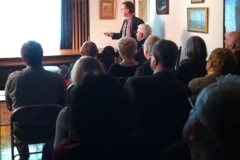Abstract
Genes and the Human Genome: Influences on Health and Disease By Wlodek Mandecki Recent sequencing of the human genome started a massive effort to develop fast “next generation” methods to obtain the sequence data from many genomes. Thousands of human genomes have been already sequenced. These data, together with determination of human genetic variation through microarray approaches, greatly helped us refine the understanding of genetic determinants of human diseases. The continued lowering costs of sequencing will lead to revolutionary changes in human gene-based diagnostics. We have already seen an impact on our understanding of genetic diseases and cancer. As all diseases have a genetic component, whether inherited or resulting from the body’s response to environmental stresses like viruses or toxins, new genome sequencing methods have universal appeal as they enable researchers to pinpoint errors in genes − the smallest units of heredity − that cause or contribute to disease. The ultimate goal is to use the results of genetic analyses to develop new ways to treat, cure, or even prevent the thousands of diseases that afflict humankind. The lecture will describe the basic concepts in genomic sequencing. We will discuss methods and instrumentation to sequence genomes, as well as methods to analyze genomic sequences. We will address what every one of us can do to advance the understanding of our own genome.
Biography
Dr. Wlodek Mandecki is President and Chief Scientific Officer of PharmaSeq, Inc., and an Adjunct Professor at the University of Medicine and Dentistry of New Jersey. Dr. Mandecki received a B.S. in Physics from the University of Warsaw, Poland, and a Ph.D. in Biochemistry from the Polish Academy of Sciences. He was an R&D Manager at Abbott Laboratories and Director of Molecular Biology at DGI Biotechnologies. He has made important contributions in the area of molecular biology, genetics, in vitro diagnostics and drug discovery. Dr. Mandecki has over 20 patents and patent applications pending. He is the author of over sixty publications in peer reviewed scientific journals.







